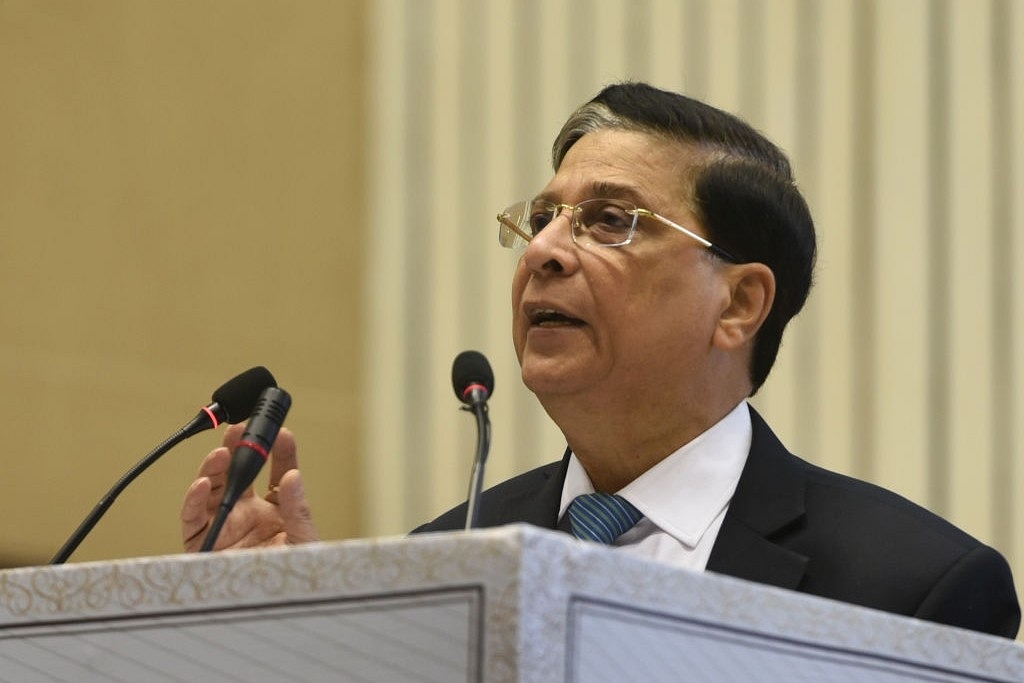Insta
#SabarimalaHearing: CJI Dipak Misra Observes Deity Has The Right To Restrict Entry To Temple As SC Reserves Judgement

CJI Dipak Misra. (Sushil Kumar/Hindustan Times via Getty Images)
The Supreme Court today (1 August) reserved its judgement on petitions seeking permission for women aged between 10 and 50 to enter the Sabarimala Ayyappa temple, after concluding its hearing of the petitioners and respondents.
During the hearing, Chief Justice of India Dipak Misra observed that the Deity at the Sabarimala Ayyappa temple had the right to restrict entry to the temple. Justice Misra’s observations came when senior counsel R P Gupta was making his submissions against the arguments to uphold the temple’s tradition of not permitting women age between 10 and 50 years.
“The Deity is a celibate and it is the Deity's will and right to protect his vow of Naishtika Brahmacharya,” the Chief Justice observed, wondering on what basis the petitioner approached the court.
Observing the practice of not allowing women between ages of 10 and 50 cannot come under Article 14 or equality before law, Justice Misra said the practice is protected by Article 25(1) that gives the right to follow or practice any religion.
Later when senior counsel Indira Jaising, appearing on behalf of non-governmental organisation Right to Bleed, was arguing against the ban on women, the Chief Justice remarked that the Deity has a right to privacy under Article 21 or protection of life and personal liberty with respect to certain rights observed in the Temple.
The five-judge bench of the apex court comprising Justice Misra, Justice Rohinton Nariman, Justice D Y Chandrachud, Justice A M Khanwilkar and Justice Indu Malhotra, during the fag end of the hearing, did not agree to amicus curiae Raju Ramachandran’s argument that there is nothing that says women (between 10 and 50 years of age) must be kept out even if celibacy was at the heart of the practice.
Justice Rohinton Nariman chipped to say that the restriction on women is because of the character of the Deity.
The Chief Justice pointed out to R P Gupta the 1991 Kerala High Court judgement which held the view that the Sabarimala temple deity was in the form of “Naishtika Brahmachari” (eternal bachelor) and it was the basis of the practice of the temple to exclude women of ages 10 to 50. Justice Misra also pointed to another observation of the Kerala High Court that reinforced the celibate nature of Lord Ayyappa and said that it was the fulcrum of the arguments of those who favoured the restrictions.
Responding to Jaising argument, Justice Nariman wondered if Article 15(1) that prevents the state from discriminating on various grounds could hold good in the case. He asked Jaising to first prove that the custom “has the force of law”.
Justice D Y Chandrachud, another member of the bench, observed that if the impact is felt by one gender, then perhaps it could attract Article 15. Jaisingh argued that the impact of the practice should be considered.
Jaising argued that the Deity has no fundamental rights even it were a person.
Ramachandran told the bench that the Deity doesn’t exercise any rights under Article 25. During the conclusion of hearing, the Chief Justice asked Swami Om for raising his voice. Swami had sought the permission of the court to make a one-minute submission and sought dismissal of petitions.
Support Swarajya's 50 Ground Reports Project & Sponsor A Story
Every general election Swarajya does a 50 ground reports project.
Aimed only at serious readers and those who appreciate the nuances of political undercurrents, the project provides a sense of India's electoral landscape. As you know, these reports are produced after considerable investment of travel, time and effort on the ground.
This time too we've kicked off the project in style and have covered over 30 constituencies already. If you're someone who appreciates such work and have enjoyed our coverage please consider sponsoring a ground report for just Rs 2999 to Rs 19,999 - it goes a long way in helping us produce more quality reportage.
You can also back this project by becoming a subscriber for as little as Rs 999 - so do click on this links and choose a plan that suits you and back us.
Click below to contribute.
Latest